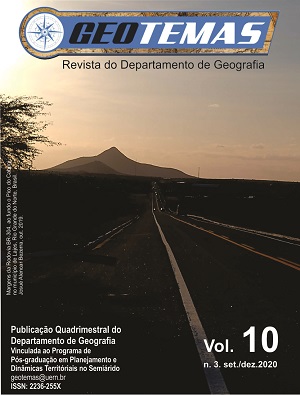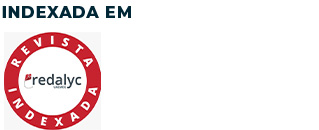The relationships between media discourse and school Geography: a possible dialogue
Keywords:
Geography teaching, media, discourse, decodingAbstract
Understanding the different mass media's language is an important issue for School Geography. Key-Categories of the Geographical Thought – between them, territory, landscape and space – are constantly presents in news, films, documentaries, serials and entertainment programs in general. In this sense, the present article presents a reflection on the relations between media discourse and the teaching-learning process in Geography in basic education. As it is a critical-descriptive investigation, the methodological resources of the analysis developed here consisted of the pertinent bibliographic survey and the literature review. To do so, execute the works of authors who carry out research on the vision of media discourse in Geography such as Vicente de Paula Leão, Iara Vieira Guimarães and Nidia Pontuschka. From the readings performed, we found that the incorporation of media material in the classroom should not be done as a complementary didactic resource, of an illustrative character, but as an object of study and be systematized in its discursive content. Therefore, it is up to the educator to promote the reframing of media discourse in the classroom and to guide his students in the management of the information that is available in the main communication vehicles.
Downloads
References
BACCEGA, M. A. Meios de comunicação na escola. Comunicação & Educação. São Paulo, v.25, p. 7-15, set/dez, 2002.
BARROS FILHO, C. de. Revista Educação, abril de 1998. In: LEíO, V. de P. O uso da mídia no ensino da geografia na educação básica. Dissertação (Mestrado em Geografia) - Universidade Federal de Minas Gerais - UFMG, Belo Horizonte, 2003.
BRUNET, R. et al. Territoire et identité. Paris: Centre Nationale de Récherche Cientifique, 1992.
CALLAI, H. C. In; PONTUCHKA, N. N. et al. Geografia em perspectiva. São Paulo: Contexto, 2006.
CARVALHO LEíO, I. A.; LEíO, V. de P.; SOUZA, H. P. de. Linguagem e conhecimento: mídia, território, identidade cultural e suas interfaces com as TICs. In: SIED/EnPED - Simpósio Internacional de Educação a Distância e Encontro de Pesquisadores em Educação a Distância, 2012, São Carlos. Anais Oficiais do Simpósio Internacional de Educação a Distância e do Encontro de Pesquisadores em Educação a Distância, 2012. Disponível em: <http://sistemas3.sead.ufscar.br/ojs/index.php/sied/article/viewFile/291/151>. Acesso em: 12 jun. 2019.
CASTELLAR, S.; VILHENA, J. Ensino de geografia. São Paulo: Cengage Learning, 2010.
CASTELS, M. A sociedade em rede. São Paulo: Paz e Terra, 1999.
CLAVAL, P. O Território na transição da pós-modernidade. Universidade de ParisSorbonne. 1996. Disponível em: <http://www.uff.br/geographia/rev_02/paul%20claval.pdf>. Acesso em: 16 fev. 2018.
FISCHER, R. M. B. Mídia, máquinas de imagens e práticas pedagógicas. Revista Brasileira de Educação, v. 12, n. 35, Rio de Janeiro, maio/ago. 2007.
GUIMARíES, I. V. Ensino de Geografia, mídia e produção de sentidos. Terra Livre, Presidente Prudente, Ano 23, v. 1, n. 28 p. 44-66 Jan-Jun/2007.
GUIMARíES, I. V. Sobre os sentidos de ensinar e compreender o mundo – discurso jornalístico e ensino de Geografia. São Paulo, Programa de Pós-Graduação da Faculdade de Educação da Universidade de São Paulo (Tese de Doutorado), 2006.
GUIMARíES, I. V. (org.). Espaço, tempo e cultura midiática na escola: propostas para o ensino de Geografia. Curitiba, CRV, 2016.
HISSA, C. E. V. A mobilidade das fronteiras: inserções da geografia na crise da modernidade. Belo Horizonte: UFMG, 2006.
LADEIRA, F. F.; LEíO, V. de P. A influência dos discursos geopolíticos da mídia no ensino de Geografia: práticas pedagógicas e imaginários discentes. Curitiba: CRV, 2018.
LEíO, V. de P. O uso da mídia no ensino da geografia na educação básica. Dissertação (Mestrado em Geografia) - Universidade Federal de Minas Gerais - UFMG, Belo Horizonte, 2003.
LEíO, V. de P.; CARVALHO LEíO, I. A. de. Ensino de Geografia e Mídia: linguagens e práticas pedagógicas. Belo Horizonte: Argvmentum, 2008.
LIPPMANN, W. Opinião Pública. São Paulo: Vozes, 2008.
MARTíNEZ SíNCHEZ, F. Os meios de comunicação e a sociedade. In: Mediatamente: televisão, cultura e educação. Brasília: SEED/MEC, 1999.
MATTOS, S. O contexto midiático. Salvador: Instituto Geográfico e Histórico da Bahia, 2009.
MORIN, E. Da necessidade de um pensamento complexo. In: MARTINS, F. M.; SILVA, J. M. (orgs.). Para navegar no século XXI: tecnologias do imaginário e cibercultura. Porto Alegre: Sulina, p. 19-42, 1999.
PARRY, R. A ascensão da mídia: a história dos meios de comunicação de Gilgamesh ao Google. Rio de Janeiro: Elsevier, 2012.
PEREIRA, D. Geografia escolar: conteúdos e/ou objetivos. Caderno Prudentino de Geografia – Geografia e ensino, Presidente Prudente, AGB, n. 17, p. 62- 74, 1995.
PFROMM NETTO, S. Telas que ensinam: mídia e aprendizagem do cinema ao computador. Campinas: Editora Alínea, 1998.
PONTUSCHKA, N. N. A geografia: Pesquisa e ensino. In: CARLOS, A. F. A. (org.). Novos Caminhos da Geografia. São Paulo: Contexto, p. 111-142, 2001.
SOUZA, C. R. F.; QUEIROZ, A. M. D. A utilização dos meios de comunicação no ensino de Geografia. Revista Eletrônica Geoaraguaia, Barra do Garças, v2, n.1, p 62 - 85. janeiro/julho. 2012. Disponível em: <http://revistas.cua.ufmt.br/geoaraguaia/index.php/geo/article/view/15>. Acesso em: 17 fev. 2019.
STEINBERGER, M. B. Discursos geopolíticos da mídia – jornalismo e imaginário internacional na América Latina. São Paulo: FAPESP, EDUC, CORTEZ, 2005.
THOMPSON, J. B. A mídia e a modernidade: uma teoria social da mídia. Petrópolis: Vozes, 1998.
Downloads
Published
How to Cite
Issue
Section
License
Authors who submit their manuscripts to Geotemas declare that the work is an original article and has not been submitted for publication, in full or in part, in another national or international scientific journal or in another circulation vehicle. The authors also declare that they agree with the transfer of the copyright of the referred article to the magazine Geotemas (University of the State of Rio Grande do Norte), allowing for later publications, as long as the source of its publication is assured. Finally, they assume public responsibility for the article, being aware that any charges arising from a claim by third parties regarding the authorship of the work may apply to them.





















